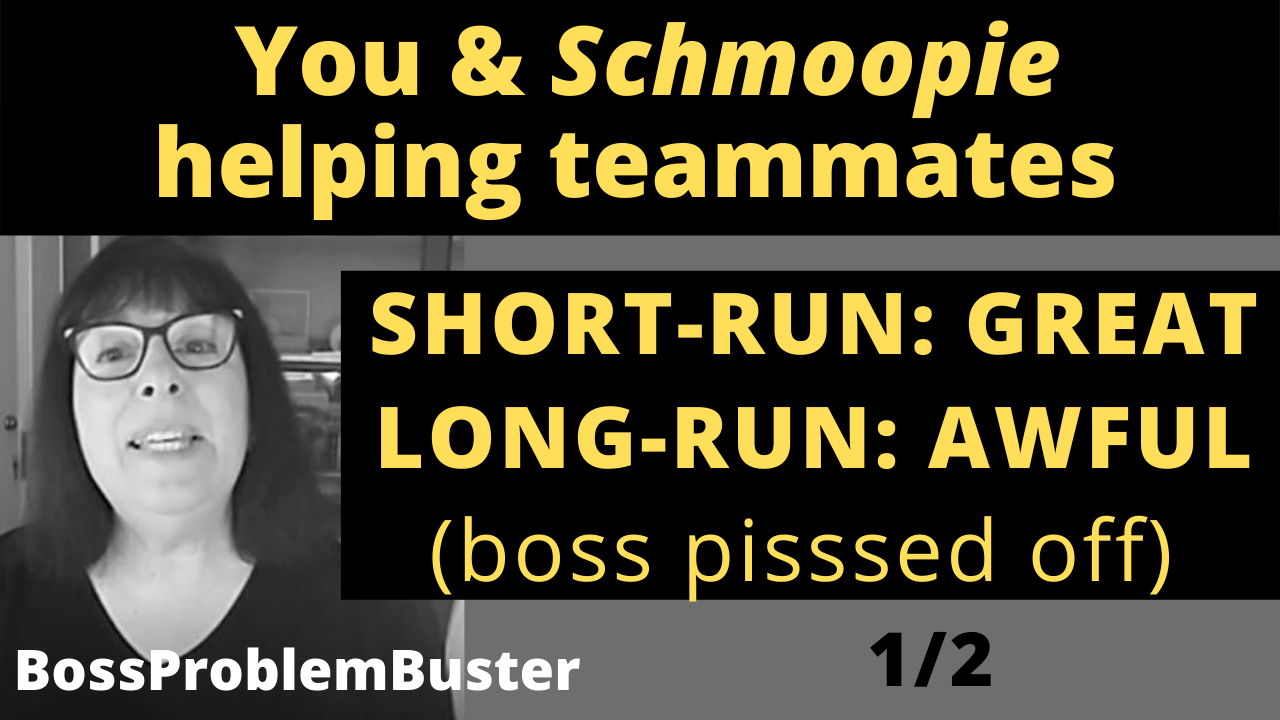BusterBits
short clips from our long-form Masterclasses
(video & text)
the best (and most unique)
career advice you’ll ever get!
low production value –
VERY HIGH content value
to get full benefit
watch / read in order
You & Schmoopie as
Go-Between Coworkers – Problem!
Bypassing Formal Workflows:
OK At First But Long-Term Will Screw Up Your Promotion & Pay Raise!
Sex and the Workplace Deck
below is a video clip + it’s full text
taken from the long-form Masterclass:
Office Romance Problems Effects & Etiquette (DOs & DON’Ts)
The Ultimate Guide
let's bring YOUR inner joy back!
We’ll bust our asses for you
(some free some paid)
but you have to make the first move:
Put in your most frequently monitored email, NOW
and get us on you’re side!
(no, no freebie – you don’t need a bribe – you need results!)
Office Romance Problems Effects & Etiquette (DOs & DON’Ts)
You & Schmoopie As Go-Between Coworkers – Problem!
The first thing you need to understand about office romance (from a promotion and pay raise perspective) is, that it is insidious in the way it cripples your career: You will not even see it coming, let alone understand how, or why.
The sooner you realize it, and the more serious and urgent consideration you give it, the sooner you will be able to counter it, with a fix.
Therefore, the more driven you are, the more attention you need to pay, to this entire Sex and the Workplace Deck, because it is the only resource online that takes you by the hand, and shows you all the BossProblems your office romance inadvertently creates, that make you un-promotable, and un-pay-raise-able from your boss’ perspective and then, shows you how to reverse engineer the fix, to each and every one of them.
This is especially true, if you see yourself as eligible for a promotion and a pay raise, based on your pre-office-romance credentials.
You may have, indeed, been eligible back then, but since you became involved with your Schmoopie coworker, things have changed dramatically, as this whole Deck proves. Everybody knows it, but you, which proves the point once again.
This is true, all the more so, if you have already been passed over for a promotion and a pay raise, and you want it to never happen again, or if you are seeking them for the first time, and want to make sure your office romance doesn’t screw-up your chances.
In both cases, you desperately need to read this post! Let’s go on with the mapping of the BossProblems that your office romance creates, from your boss’ perspective, so you can reverse engineer the fix!
The no. 5 office romance BossProblem, that makes you un-promotable, and un-pay-raise-able, is: Bypassing formal workflows and procedures
In other words: Pissing your boss off, even further. Why “even further”? Because of all the previous office romance BossProblems you have already cause, that’s why! (You have not exactly ingratiated yourself on your boss, to put it mildly.)
[And if you haven’t yet watched the previous installments of this Deck – they’re a guaranteed eye opener that can save your career, (if I may say so myself) so you really should! Watch/read them here].
Anyway, now, you are pissing your boss off even further, by messing with something even more critical than all those previous office romance BossProblems we’ve covered before.
Why is it so critical? It is critical because formal workflows and procedures are the fundamentals of your team’s performance. And through a domino effect, also your boss’ performance, his boss’ performance, and so on.
In other words, formal workflows and procedures are the infrastructure of the effectiveness and efficiency of your team or department, and the company as a whole. Therefore when you bypass them, you compromise that effectiveness and efficiency. Which pisses your boss off with you. Thus, it is easy to see how this would, indeed, further escalate your already problematic (not to say negative) standing with your boss.
Now you’re probably wondering, or maybe even getting angry with me, thinking: “What does my office romance have to do with formal workflows and procedures??? These are two completely different things!”
Well, they are completely different but, they are also interdependent in ways most employees, don’t really realize. Let me give you an example that will make this crystal clear, so that you can reverse-engineer the fix, from it.
First, we need to setup the backdrop for the example.
– Suppose you and your Schmoopie are working in adjacent teams, or departments, that are ‘internal customers’ of one another.
[By the way, this scenario is – if you were wondering – consistent with the premise that, you love birds are coworkers: There are many organizational situations, in which you structurally belong to different teams, but in practice, work closely together, on a daily basis].
So, on with the setup:
– As ‘internal customers’ of one another, your two teams have daily communications to exchange information and agree on solutions for the frictions and problems that come up.
– To support this, there’s an infrastructure in place, of two kinds: a physical infrastructure, in the form of computers, landlines and so forth, and an operational and administrative infrastructure, in the form of formal workflows and procedures: Who does what, when, where, and why.
– Maybe there’s even a designated coordinator, to oversee this daily exchange.
So far so good. That’s a normal organizational reality, that we are all familiar with. But here is where the plot thickens, insidiously, against you. Which brings us to the example itself.
When these ‘internal customer’ teams have two Schmoopie-s, such as yourselves, one on each team, both teams grow accustomed to relaying issues, and solving frictions, through your romantic relationship, instead of through the formal workflows and procedures.
How so? Here’s how: Say Jim, on the one team, and Bob, on the other, have some professional friction. The formal workflows and procedures would direct, discussing it in the next mutual meeting, or through the designated coordinator, if one exists. Pretty straightforward.
But, that’s not what happens, in practice. In practice, Jim, who’s on your team, comes by your cubicle one day, and says: “Hey… listen… I have this situation with Bob… could you talk to your Schmoopie on the other team, and help me smooth it out? It’s really delaying my project, and I know they are friends, so…could you?”
Now, you being the good, helpful, teammate you are, say “sure!” and then you broker the situation, through your Schmoopie, and succeed.
So, great, right? Well… yes and no: Great in the short run. Problematic in the long run.
In the short run, of course that’s the right thing to do. Why wouldn’t you two help your teammates? You would be assholes not to try! Of course you should!
Plus it will be a ‘positive’ in your boss’s mind, in regards to your interpersonal abilities. Thus, promoting your chances for a pay raise and a promotion.
The problem lies, in the long run, when this can totally flip over, and hinder your chances. This post is about making you aware of exactly this danger, in terms of how your boss sees you in this context, so that you can mitigate it, to prevent such hindrance to your chances of getting that promotion and/or pay raise, you want.
Plus, when you understand this danger, you can reverse engineer a fix, which we will do together, on the last installment of this Deck.
So what is this danger? Well, what started as an occasional gesture, will gradually progress to a shortcut of convenience, and will end up as a permanent informal workflow.
The longer you are together as a couple, and on the same teams respectively, the more this informal workflow will become anchored, to the point of becoming a non-official, non-formal procedure, that, unintentionally, replaces the formal one.
And if someone on either team doesn’t like the formally designated coordinator (if one exists) then all the more so – who needs them when they can just come to you Schmoopie-s, instead.
Moreover, when a new teammate comes onboard, they will be sure, this informal workflow is the formal workflow, or that you are the designated coordinator, because they will have never seen anything else!
Thus, the more time passes, the more entrenched this counterproductive process, is.

